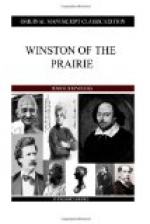Winston’s nod signified comprehension, for the struggle between the great range-holders across the frontier and the smaller settlers who with legal right invaded their cattle runs was just over. It had been fought out bitterly with dynamite and rifles, and when at last with the aid of the United States cavalry peace was made, sundry broken men and mercenaries who had taken the pay of both parties, seeing their occupation gone, had found a fresh scope for their energies in smuggling liquor, and on opportunity transferring cattle, without their owner’s sanction, across the frontier. That was then a prohibition country, and the profits and risks attached to supplying it and the Blackfeet on the reserves with liquor were heavy.
“Business this way?” said Winston.
Courthorne appeared to consider a moment, and there was a curious little glint in his eyes which did not escape his companion’s attention, but he laughed.
“Yes, we’re making a big run,” he said, then stopped and looked straight at the rancher. “Did it ever strike you, Winston, that you were not unlike me?”
Winston smiled, but made a little gesture of dissent as he returned the other’s gaze. They were about the same height and had the same English type of face, while Winston’s eyes were gray and his companion’s an indefinite blue that approached the former color, but there the resemblance, which was not more than discernible, ended. Winston was quietly-spoken and somewhat grim, a plain prairie farmer in appearance, while a vague but recognizable stamp of breeding and distinction still clung to Courthorne. He would have appeared more in place in the States upon the southern Atlantic seaboard, where the characteristics the Cavalier settlers brought with them are not extinct, than he did upon the Canadian prairie. His voice had even in his merriment a little imperious ring, his face was refined as well as sensual, and there was a languid gracefulness in his movements and a hint of pride in his eyes. They, however, lacked the steadiness of Winston’s, and there were men who had seen the wild devil that was born in Courthorne look out of them. Winston knew him as a pleasant companion, but surmised from stories he had heard that there were men, and more women, who bitterly rued the trust they had placed in him.
“No,” he said dryly. “I scarcely think I am like you, although only last night Nettie at the settlement took me for you. You see, the kind of life I’ve led out here has set its mark on me, and my folks in the old country were distinctly middle-class people. There is something in heredity.”
Courthorne did not parry the unexpressed question. “Oh yes,” he said, with a little sardonic smile. “I know. The backbone of the nation—solemn, virtuous and slow. You’re like them, but my folks were different, as you surmise. I don’t think they had many estimable qualities from your point of view, but if they all didn’t go quite straight they never went slow, and they had a few prejudices, which is why I found it advisable to leave the old country. Still, I’ve had my fill of all that life can offer most folks out here, while you scarcely seem to have found virtue pay you. They told me at the settlement things were bad with you.”




